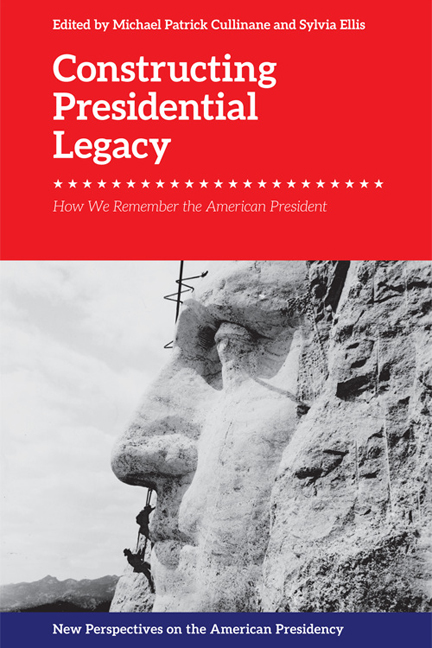Book contents
- Frontmatter
- Contents
- Acknowledgments
- Notes on Contributors
- An introduction to Presidential Legacy
- 1 Presidential Temples: America’s Presidential Libraries and Centers from the 1930s to Today
- 2 Presidential Legacy: A Literary Problem
- 3 Pennsylvania Avenue meets Madison Avenue: The White House and Commercial Advertising
- 4 Eisenhower’s Farewell Address in History and Memory
- 5 Pageantry, Performance, and Statecraft: Diplomacy and the Presidential Image
- 6 “You’ve got to decide how you want history to remember you”: The legacy of Lyndon B. Johnson in film and Television
- 7 The Farewell Tour: Presidential Travel and Legacy Building
- 8 Reflecting or Reshaping?: Landmark Anniversaries and Presidential Legacy
- 9 From a “New Paradigm” to “Memorial Sprawl”: The Dwight D. Eisenhower Presidential Memorial
- 10 Top Trumps: Presidential Legacies, New Technologies, and a New Generation
- Epilogue: Confessions of a Presidential Biographer
- Index
An introduction to Presidential Legacy
Published online by Cambridge University Press: 01 May 2021
- Frontmatter
- Contents
- Acknowledgments
- Notes on Contributors
- An introduction to Presidential Legacy
- 1 Presidential Temples: America’s Presidential Libraries and Centers from the 1930s to Today
- 2 Presidential Legacy: A Literary Problem
- 3 Pennsylvania Avenue meets Madison Avenue: The White House and Commercial Advertising
- 4 Eisenhower’s Farewell Address in History and Memory
- 5 Pageantry, Performance, and Statecraft: Diplomacy and the Presidential Image
- 6 “You’ve got to decide how you want history to remember you”: The legacy of Lyndon B. Johnson in film and Television
- 7 The Farewell Tour: Presidential Travel and Legacy Building
- 8 Reflecting or Reshaping?: Landmark Anniversaries and Presidential Legacy
- 9 From a “New Paradigm” to “Memorial Sprawl”: The Dwight D. Eisenhower Presidential Memorial
- 10 Top Trumps: Presidential Legacies, New Technologies, and a New Generation
- Epilogue: Confessions of a Presidential Biographer
- Index
Summary
At the ground breaking of the Robert Frost Library at Amherst College, President John F. Kennedy gave the convocation and reflected on the importance of legacy and memorials. “A nation reveals itself, not only by the men it produces, but by the men it honors,” he told the gathering. Kennedy feted Frost as a man of infinite importance to American culture, and congratulated Amherst for commemorating a poet rather than a president. “In America, our heroes have customarily run to men of large and dramatic accomplishment,” but the Frost Library, Kennedy noted, memorializes “our spirit.” By celebrating a writer rather than a statesman, a critic rather than a general, Kennedy believed that Amherst expanded our memory of the American experience.
That endorsement was especially poignant because little more than a week after he addressed the college, Kennedy was dead. His assassination obscured the thrust of his argument—that in the United States, memorials and tributes skew towards men of dramatic accomplishment like generals and presidents. The public clamor to confer martyrdom on the slain president led to the proliferation of memorials at home and abroad, and the commemorative activities seemed to prove Kennedy's point. If we count the memorials, there are few personalities larger than the president and no single office as emblematic of the American experience. Presidents leave the White House with a weighty legacy derived primarily from their role as head of state, and they often act as emblems of the era in which they serve. It is popular to summarize the national condition with epochal monikers like the “Age of Jackson” or the “Reagan Revolution,” and in doing so bestow an entire era to a president. Times of prosperity or stagnation affect our recollection of their stewardship, as does social progress or lack thereof. Presidential legacies come to embody their achievements, shortcomings, transgressions, and the precedents they set. In addition, the consequences of their decisions—intended or unintended—contribute to our memories of presidential administrations and help construct a legacy.
Successive generations play a considerable role in determining how we consider presidential leadership, and Kennedy's Amherst speech recognized one of the most important factors in legacy production: people.
- Type
- Chapter
- Information
- Constructing Presidential LegacyHow we Remember the American President, pp. 1 - 10Publisher: Edinburgh University PressPrint publication year: 2018

